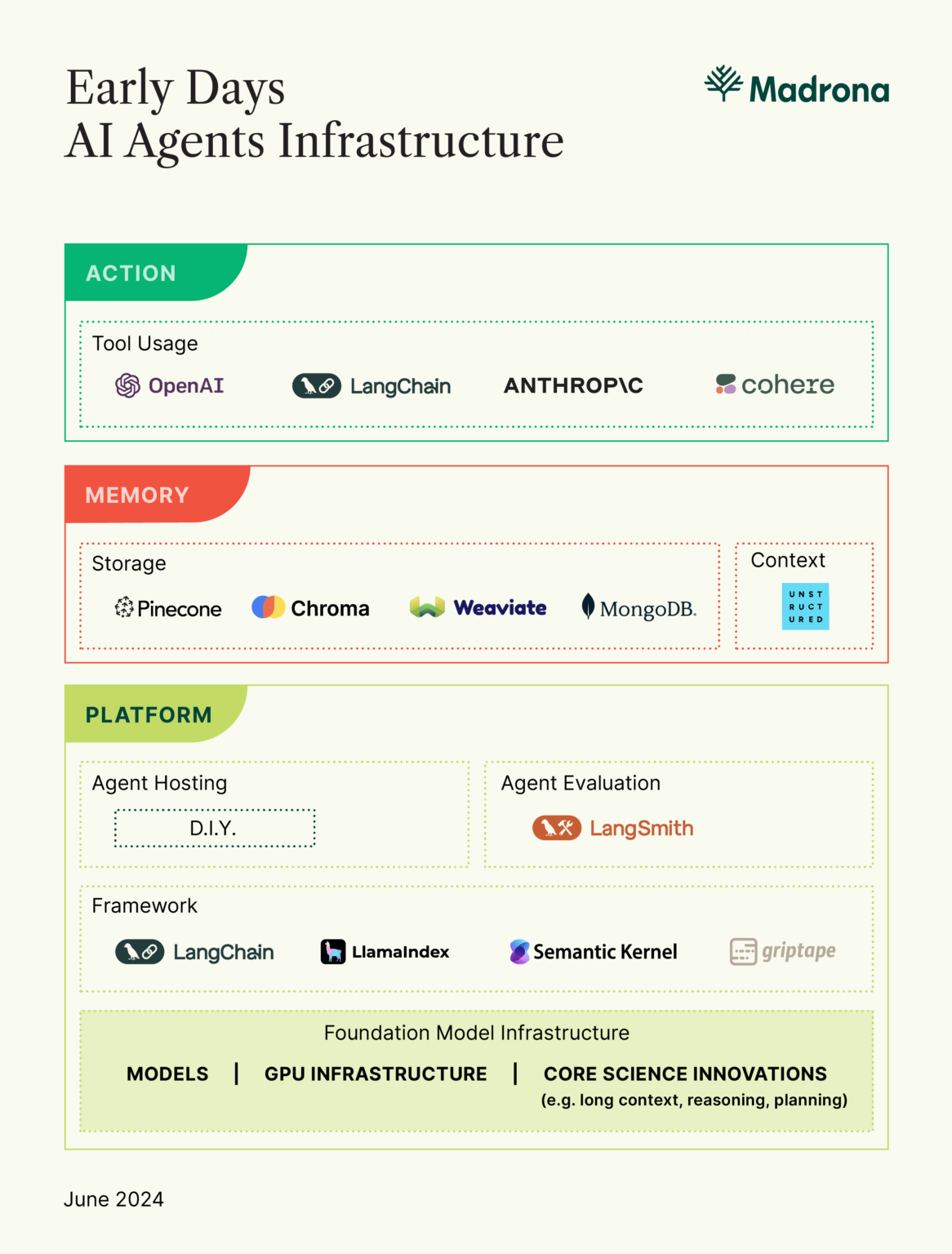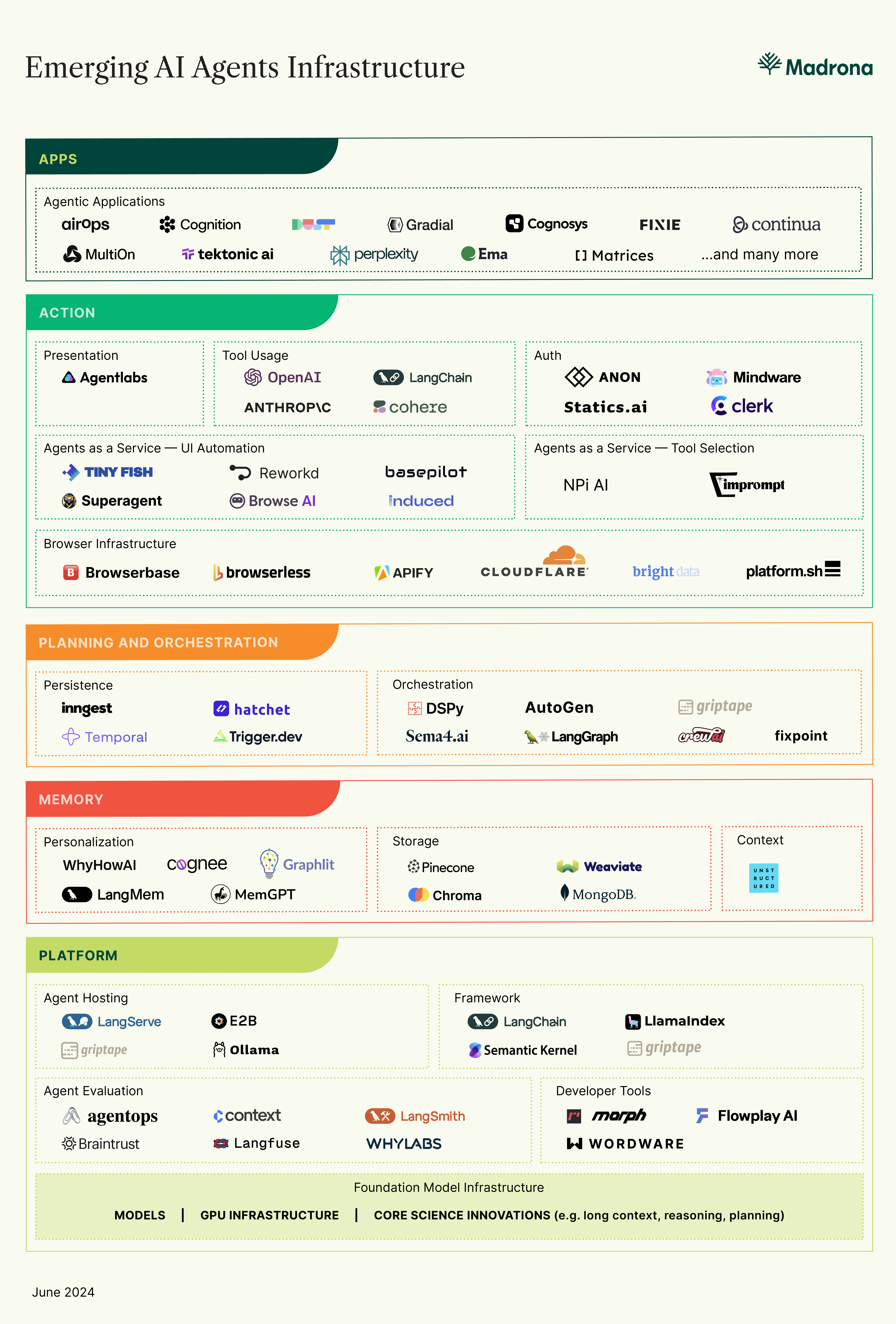AI Agent is approaching to production ready by leverage emerging managed infrastructure
Wells Wang<w@npi.ai> • 2024/06/10

vs

Madrona Venture, an investor in companies like Amazon, Snowflake, and UiPath, posted an insightful article The Rise of AI Agent Infrastructure (opens in a new tab) by Jon Turow on June 5th, detailing the latest trends in AI agent development.
As an AI Agent developer, I found this article to be the one of best I’ve read in 2024, echoing many of my own views. I strongly recommend anyone involved with AI agents spend 10 minutes reading it.
Here are some highlights from my personal perspective and understanding of the article:
-
AI agent workloads are shifting from self-hosted to managed services.
-
More specialized AI agent development tools are emerging, helping developers build more robust agents.
These trends are familiar to us all. About fifteen years ago, we began migrating our workloads from private data centers to the cloud, embracing various cloud-native development tools like S3, SQS, RDS, Redis, MongoDB, Snowflake, Okta, and more, instead of maintaining our own infrastructure.
From Ed Huang, the co-founder and CTO of PingCAP, I learned a valuable software engineering philosophy: "Make it work, then make it right, and finally, make it fast." I believe AI agents will follow a similar process.
In the past 18 months, we are struggled with building reliable AI Agent for lacking best practices, and no specified products. Thus, we had to build everything from scratch to make AI Agents work. Products like LangChain were the best choice of this stage.
As we're exploring deeper, we try to make AI agents work right and faster, which involving more code tasks to accomplish. As a result, this led to the common patterns are rapidly recognized by the industry: Fine-tuning, RAG, Evaluation, multi-agent collaboration, and tool use(also known as function calling). But each of these patterns are packed with technical details and are evolving quickly, making it challenging to keep up with the latest advancements. Attempting to maintain all this infrastructure would be a massive technical overhead and financial cost.
At this time, we naturally recall our past successes story: we desire more composable specific tools within best practices. Integrating these tools into our products then focus on business-critical value, enabling us to build a product that satisfies our users quickly and effectively.
Therefore, we witness the emergence of a flourishing ecosystem of specialized tools. Each tool will focus on addressing specific problems in AI agent development, replacing the previous all-in-one solutions, giving developers more space and flexibility to make AI agents work right and faster.
Otherwise, I would like to select 4 high-potential open-source tools from Madrona Venture's landscape you may interest, There are:
NPi - Function calling API platform
- Website: https://www.npi.ai (opens in a new tab)
- GitHub: https://github.com/npi-ai/npi (opens in a new tab)
- Introduction: Platform providing Tool-use APIs to empower AI agents with the ability to operate and interact with a diverse array of software tools and applications.
- Use-case: make your AI Agent can control various software in minutes to get thing done.
- About: NPi will release Cloud Preview in the end of June, 2024, but you can try it out now on the https://try.npi.ai (opens in a new tab).
E2B.dev - Secure sandboxes for AI-generated code execution
- Website: https://www.e2b.dev (opens in a new tab)
- GitHub: https://github.com/e2b-dev/E2B (opens in a new tab)
- Introduction: Python & JS/TS SDK for adding code interpreting to your AI app
- Use-case: Code interpreter is a powerful tool for LLM, E2B let your Agent can execute real-time generated code in a safe way.
CrewAI - Multiagents Orchestration Framework
- Website: https://www.crewai.com (opens in a new tab)
- GitHub: https://github.com/joaomdmoura/crewai (opens in a new tab)
- Introduction: Framework for orchestrating role-playing, autonomous AI agents. By fostering collaborative intelligence, CrewAI empowers agents to work together seamlessly, tackling complex tasks.
- Use-cases: Multiagents is the cutting-edge technology in LLM-based Agent, CrewAI is the best tool for multiagents collaboration
Agentops - Agent observability toolkits
- Website: https://www.agentops.ai (opens in a new tab)
- GitHub: https://github.com/AgentOps-AI/agentops (opens in a new tab)
- Introduction: Python SDK for agent monitoring, LLM cost tracking, benchmarking, and more. Integrates with most LLMs and agent frameworks like CrewAI, Langchain, and Autogen
- Use-case: Build reliable AI agents with monitoring, testing, and replay analytics. No more black boxes and prompt guessing.
If you enjoy with this post and would like to discuss more, you could find me by Email, X.com (opens in a new tab), or LinkedIn (opens in a new tab).